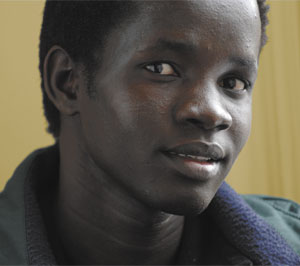 |
| Yong Jacob Deng. (Danny Abriel Photo) |
It’s only $1.50, but to Thein Gi Shwe from Burma and Yong Jacob Deng from Sudan, it means everything.
Every year, full-time Dalhousie students contribute $1.50 through their student fees to WUSC Dalhousie’s student refugee program. With the money, WUSC supports two students at Dalhousie, taking care of tuition, housing, books and monthly allowance. WUSC volunteers meet the newcomers at the airport, help them settle in residence and give them a tour of Halifax and Dalhousie.
“Every day I am learning,” says Mr. Deng, who arrived in Halifax last August after living for eight years in a crowded refugee camp in Kenya.
Now he’s in his first year at Dalhousie, studying civil engineering and working part-time at the Killam Library. His freedom is hard to get used to: “I keep expecting the authorities to stop me and ask me, Why are you here? Where is your visa?
“When I was in Kenya I could not figure out what life would be like … I could not imagine how friendly and helpful people would be (when I got here). I didn’t know anything: how to do my banking, how to work a computer when many of my assignments were online. My friends, my classmates – they do a lot. They don’t even run away when I need help.”
At “Camp to Campus,” a WUSC-sponsored event last month, Mr. Deng conveyed his thanks: “I greatly appreciate what Canada, Dalhousie and all of you present here have done for me.”
At 22 years of age, he’s been through so much. As a small boy, he and his mother and grandmother fled violence in their home village in the Jonglei region of Sudan and escaped to Equatoria in the extreme south. Mr. Deng found himself terrified and alone at the age of 14 when soldiers took his mother away. He was sent to Kakuma, a large refugee camp in northern Kenya that’s home to more than 70,000 people from Sudan, Somalia and Ethiopia.
Malnutrition, communicable diseases and malaria are just some of the problems plaguing refugees in the dusty camp. Through his teen-age years, Mr. Deng survived on little more than beans, maize and a keen desire to learn. His marks from elementary school were very good and he was awarded a scholarship by the Jesuit Refugee Service to attend high school.
“I didn’t have any other source of hope, of comfort,” explains Mr. Deng, who found out just months ago that his mother is still alive and living in Sudan. “I thought I was done. I could not see the future. My only source of consolation was to try and study. When I did well, I got attention and people were willing to help me. And I offered what I could too. I worked as a volunteer to teach the younger children.”
WUSC works with overseas partners in refugee camps in Africa and Asia to identify suitable students like Mr. Deng to come to Canada. For the past three decades, WUSC’s student refugee program has enabled more than 900 men and women to resettle in Canada as permanent residents and pursue their education.
In July of each year, the Dalhousie chapter receives word of the two new students who are coming and begins preparing their welcome. While the student refugee program is the WUSC’s main focus, the organization also works to heighten awareness of the issues refugees face around the world and offers university students volunteer learning opportunities in developing countries.
Julia Keech, studying international development at Dalhousie, has been a WUSC volunteer for the past three years. Her involvement brings her studies alive.
“Being in IDS, I hear people complain that they feel discouraged about the state of the world, that they feel small and helpless,” says Ms. Keech, from Grand Pre in Nova Scotia’s Annapolis Valley.
“But I have an opposite feeling about that. I feel this program is at the heart of international development studies. It’s so hands-on, and I know this sounds corny, but you really are making a difference in someone else’s life.”
